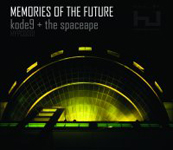|
|
 |
Dusted Reviews
Artist: Kode9 + The Spaceape Album: Memories of the Future Label: Hyperdub Review date: Jan. 15, 2007 |

|
|
|
 |
With Kode9 + The Spaceape’s debut album, the doors to the church of dubstep stretch that little bit wider. In fact, it’s starting to look – contextually, at least – positively non-denominational.
What I enjoy most about Memories of the Future is its reach: much like the Burial album, its predecessor on Kode9’s consistently excellent Hyperdub label, it moves beyond the sub-bass trauma and blockish beats of dubstep’s 12” missives into an intensely personalized, at times highly claustrophobic zone. It feels hermetically sealed off, but not locked into one way dialogue – rather, it deals with the ghost trails of genres, drawing from some of the most abstracted signals sent out by dubstep, its ‘other half’ Grime, and their predecessors: the skip of Garage, the shadowplay of Jungle at its darkest, the spatial delirium of mid-’90s “heroin house,” back through to the disorientation of dub’s echo-maze.
Indeed, it’s the memory work that Kode9 does through his productions that makes Memories of the Future so rich and resonant, even as he scales everything back to the bare minimum. On opener “Glass,” pared-back programming meets destabilised bass as a melodica swims through muddied waters. Ms Haptic’s voice turns into a sepulchral shimmer on “Curious,” while rhythms stumble and stagger, halting in mid-air. “Sine” and “Correction” are the most compelling tracks, though. They’re dropped mid-album as a lacuna of barely-repressed hostility; “Sine” is staggering, a wobbling drone and bell-chime chord suspending Space Ape above a deconstructed city vista, his delivery of the lyrics (from Prince’s “Sign O’ the Times”) leeched of any affect, sounding exhausted and drained.
Simon Reynolds once implied that the “home listening” album served as the death knell for any dance music genus. But I don’t see that being a problem for dubstep: it’s surprisingly malleable, and appears capable of sustaining both dancehall and lounge-room without sacrificing any of its vitality. Memories of the Future is so strong because it suggests several end or exit points for dubstep if need be, but it’s also exemplary of the breadth and strength of the genre.
By Jon Dale
|







